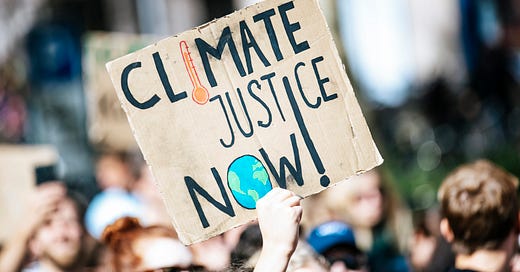Episode 6: Carbon Pricing Hits a Brick Wall on the Left
And the future of progressive climate policy
Listen on Spotify or Apple Podcasts
The final episode of Season One is about the future of progressive climate policy. Why does President Biden’s American Jobs Plan not even mention carbon pricing? We start by speaking with Michael Méndez (Assistant Professor at UC-Irvine) and Danny Cullenward (energy economist and lawyer at CarbonPlan and Stanford) about the tensions between policymakers and environmental justice advocates around California’s cap-and-trade program. This case study informs our conversation with Keya Chatterjee (Executive Director of USCAN) about progressive critiques of carbon pricing policy and outcomes. David Roberts (author of the Volts newsletter) helps us understand what progressives favor instead: sector-specific standards and massive investments in infrastructure, emphasizing justice. We close with a discussion of political pathways to future progressive climate action.
If you’re just joining us, welcome! We’re looking at you— folks from our feature in the New Yorker The Climate Crisis newsletter by Bill McKibben. Because we’re a limited series, we recommend listening sequentially, since each episode builds on the last:
Episode 1: Introduction to Carbon Pricing
Episode 2: What’s the Right Price for Carbon Emissions?
Episode 3: The Road to Paris
Episode 4: Why Doesn’t the U.S. Have a National Price on Carbon?
Episode 5: The Conservative Case for Carbon Pricing
If you think it’s valuable for more people to get familiar with climate policy—and the concept and story of carbon pricing in particular—please share this podcast with friends and colleagues: https://pricingnature.substack.com/.
Notable quotes:
On opposition to market-based mechanisms from the progressive left:
Keya Chatterjee: There's simply a philosophical opposition—particularly in many indigenous cultures—there's a philosophical opposition to the idea that you can give money to pollute. You can give money and continue to do something wrong as long as you pay to do that thing.
Michael Méndez: Initially, maybe 10 or 15 years ago, a majority of California environmental justice groups were advocating for carbon pricing. While it's still a market-based solution or a neoliberal solution, it more closely aligned to their goals of having more stringent reductions in polluting facilities near the communities that they were living in. Over the time that evolution has changed a little and environmental justice groups have grown and have more influence in state legislatures and city halls, and to some extent at the federal government, where they're advocating against all types of market-based mechanisms or neoliberal solutions.
On how to finance decarbonization:
Keya Chatterjee: We have massive income inequality in this country. We have massive racial injustice. We have a huge wealth gap between black and white people in this country, a massive wealth gap. There is nothing that we should be doing that puts any additional burden on people who have less. It should be quite the opposite. If we need to pay to deal with the climate crisis, that money should come from the people who created the climate crisis, the polluters. If we need more money, it can come from a wealth tax.
On the political strategy of the Green New Deal:
David Roberts: I think they realized there just aren't enough environmentalists to do something this big. Like we're talking about remaking the entire economy. We're talking about revolutionizing the entire direction of the world, you know? And that's not something that the “environmental movement” has the juice to do. If we want to do that, we have to build a coalition. We have to bring everybody together.
Further reading on today’s episode:
Act 1: What went wrong in California?
Climate Change from the Streets, by Michael Méndez
Climate policy, environmental justice, and local air pollution, by Meredith Fowlie, Reed Walker, and David Wooley
Letter opposing Mary Nichols for Administrator of the Environmental Protection Agency
Tracking banking in the Western Climate Initiative cap-and-trade program, by Danny Cullenward, Mason Inman, and Michael Mastrandrea
Do Environmental Markets Cause Environmental Injustice? Evidence from California’s Carbon Market, by Danae Hernandez-Cortes & Kyle C. Meng
A critique of “Do Environmental Markets Cause Environmental Injustice?, by Danny Cullenward and Katie Valenzuela
Act 2: The climate policy puzzle: Is carbon pricing a missing piece, or is it not a piece at all?
USCAN’s Vision for Equitable Climate Action, led by Keya Chatterjee
At last, a climate policy platform that can unite the left, by David Roberts
Making Climate Policy Work, by Danny Cullenward and David Victor
Act 3: The path to progressive climate action
Joe Manchin: I will not vote to eliminate or weaken the filibuster, in the Washington Post
Washington state now has the nation's most ambitious climate policy, by David Roberts
Cover Photo by Markus Spiske on Unsplash





